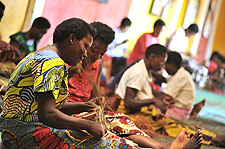
Think of it as UNICEF
meets Bentonville. In honor of International Women’s Day, Walmart is devoting a section of its Web site to selling products from women-owned businesses, ranging from iPad covers from Nepal to
Haitian papier-mâché. Called Empowering Women Together, the site is intended to connect U.S. shoppers with these small companies. The retailer says its hope is that by selecting items
that are “on-trend and priced right, we are giving our customers the chance to do good with their dollars -- it's a positive and powerful proposition for everyone.”
Altogether, there are some 200 products from 19 different businesses located in nine countries. Nine are from the U.S.
advertisement
advertisement
The site includes stories from the
businesses, such as Gahaya Links, a Rwandan weaving cooperative. Formed with 20 women just after 1994’s Rwandan Genocide, it has grown to include 4,000, many of them survivors.
The effort is part of Store for Good -- a concept the Bentonville, Ark.-based retailer is developing, which will eventually include eco-friendly products and healthier food options.
Cynics will doubtless find irony in the move. In 2011, several months after the U.S. Supreme Court blocked a 1.5-million-member class-action suit, the largest in U.S. history, Walmart
announced its Global Women’s Economic Empowerment Initiative. The stated goal of that five-year effort it to increase sourcing from women-owned businesses to $20 billion, and “empowering
nearly 1 million women through training.”
Since then, the chain has been the target of sex-discrimination suits in several other states.
Meanwhile, Avon is
also using International Women’s Day to showcase its efforts against domestic violence. And corporate sponsors of the event include BP, which is running a “Discover BP’s Feminine
Side” slideshow on the organization’s Web site, as well as Scotiabank and International Finance Corp.
And to commemorate the event, Unilever’s Dove says it
is relaunching its popular “Ad Makeover” effort, via Facebook. Last year, more than 33 million women participated, calling out ads that made them feel inadequate and promoting more
nurturing messages like “The perfect bum is the one you're sitting on” and “Your birthday suit suits you.”